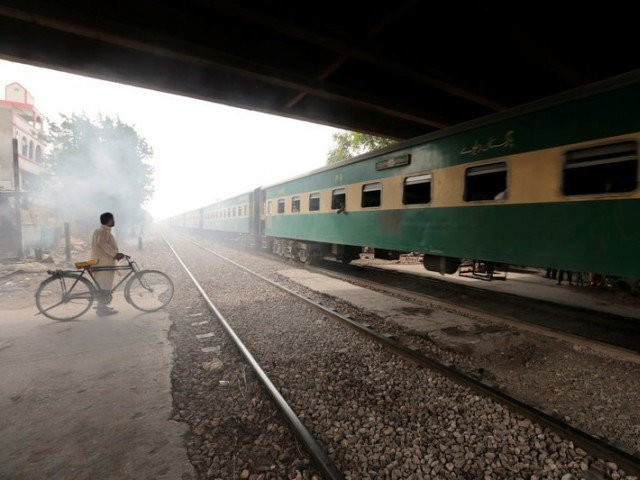Can the Karachi plan revive the city’s lifeline projects?
KCR revival, K-IV completion have long been in limbo, despite growing need

It’s no secret that Karachi’s a mess, falling prey to everything from political clashes and natural disasters to sheer negligence and incompetence - and endless snags in multiple development projects.
The recent rainfall appeared to be the last straw for the millions who call the city home. And with cries for change echoing all around, Prime Minister Imran Khan finally announced a Rs1.1 trillion ‘Karachi Transformation Plan,’ signifying intent to revive the metropolis by completing many of its languishing mega-projects.
But the question remains: will the plan suffice to revive the Karachi Circular Railway (KCR) and complete the Greater Karachi Bulk Water Supply Project (K-IV) - two crucial projects that have been delayed for a multitude of reasons?
Wheels in motion?
Of Rs572 billion reserved for transport infrastructure in Karachi Transformation Plan, Rs305.23 billion has been earmarked for KCR’s restoration.
An intra-city rail service connecting what are now the South, East, West and Central districts, the project was originally set in motion in 1964. At its peak, it ran 104 trains a day, facilitating thousands of commuters.
The wheels ground to a halt in 1999, and the tracks rusted away, encroached by vegetation and illegal structures until the Centre made the first solid move towards restoring it. In 2008, it incorporated the Karachi Urban Transport Corporation into the Securities and Exchange Commission of Pakistan, visualising it as the regulatory body to oversee KCR’s revival.
Following this, Japan International Corporation Agency entered the scene, working on solutions for the KCR’s revival, including the resettlement of those displaced by it, with plans to undertake the project on soft loans.
But differences soon arose.
In November 2016, The Express Tribune reported a deadlock between JICA and the Sindh government over the agency’s financial commitments. Meanwhile, reports accusing the Sindh government of planning irregularities in the project also emerged, eventually resulting in JICA stepping back.
The project was then included in the China-Pakistan Economic Corridor on the Sindh chief minister’s request and then-PM Nawaz Sharif’s orders. The Rs249.2 billion project was to be handed over to Sindh, which was to see its completion with Chinese funding.
What ensued were further delays and shirked responsibilities.
The matter was taken up by the Supreme Court this year, with the apex court setting deadlines after deadlines for KCR’s revival - which the authorities repeatedly failed to meet.
Now, as part of the Karachi Transformation Plan, the aim is to complete it in the coming three years, under Sindh’s supervision, opening avenues for a city in desperate need of well-functioning public transport.
On paper, the initiative includes the replacement of the current track by a dual gauge track, allowing trains with different track gauges to pass. Laying the tracks along the 43.2km-long KCR path alone would cost Rs300 billion, of which Rs249.2 billion is to be borrowed from China, with Sindh providing the rest.
Separately, Pakistan Railways has also been restoring a part of the track, aiming to set two trains running from Orangi in motion in the coming three months, in line with court orders.
The track from City to SITE station has been restored, while the track from City to Orangi station is yet to be restored. The remaining track will be restored and underpasses and overhead bridges constructed in the second phase by the Sindh government.
Let it flow
Apart from the KCR project, the long-awaited K-IV bulk water project has also been included in the plan.
Of Rs92 billion set aside of water supply projects in Karachi Transformation Plan, Rs80 billion has been reserved for the execution of K-IV’s first phase - which has been embroiled in controversies over financial and design-related issues. As a result, work has been stalled for the past year, even as the city struggles with a worsening water crisis.
K-IV’s foundation stone was laid in 2016 and it was to be completed in two years. Four years on, only 20 per cent of the work has been done.
The project aims to supply 260 million gallons of water per day (MGD) to the city, building a 121km canal system from Keenjhar Lake to Karachi.
Experts outline three major hurdles for the project: its route, design and increase in construction cost over the years. However, they said, issues regarding its design were resolved three months ago, with the consultant given two months to fix it.
On the other hand, they see light at the end of the tunnel with the PM announcing funds for the project under the Karachi Transformation Plan, hoping it will suffice to resolve cost-related problems.
Earlier, the Sindh government had tasked the National Engineering Services Pakistan to review its design, with the latter submitting a report three months ago. But this gave rise to a new problem: the report stated it was necessary to alter the project’s route, increasing the cost.
Subsequently, a technical committee was set up to review NESPAK’s report. Though it rejected the change in route - NESPAK’s main proposal - it concluded there were design issues that needed to be address.
Work on the project reportedly restarted gradually a few months ago.
But, even though Phase 1 will ease the crisis, it will take more than its completion to rid Karachi’s of its water woes. Hence, the second and third phases, supplying 390MGD of water out of the 650MGD capacity, are equally important.
Acknowledging Karachi’s water shortage, the PM announced K-IV’s inclusion in his plan, saying that both Sindh and the Centre would contribute to Phase 1. Following this, the city’s water scarcity problem would be permanently resolved within three years, the PM promised.
Whether this promise comes to fruition, though, is yet to be seen.
Published in The Express Tribune, September 7th, 2020.


















COMMENTS
Comments are moderated and generally will be posted if they are on-topic and not abusive.
For more information, please see our Comments FAQ